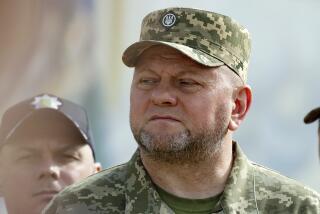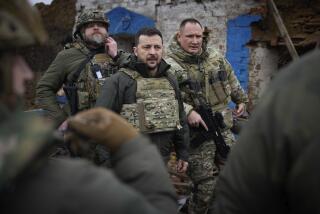Old Soldier Doesn’t Fade Away
- Share via
The word from Moscow is that Marshal Nikolai Ogarkov, who lost his job as chief of the Soviet general staff 10 months ago, has made a highly unusual comeback. According to reports circulating in the Soviet capital, the marshal has been named commander of Warsaw Pact forces--a post that carries with it the title of first deputy minister of defense.
So far there has been no official confirmation. But Soviet-watchers in the United States are inclined to believe that the reports are true. Assuming that they are, Ogarkov’s return is one of the most intriguing of the personnel changes that have been made by Mikhail S. Gorbachev since he took over the Soviet leadership in March.
Ogarkov’s comeback was apparently part of a major shuffle involving the replacement of four top-level Soviet generals; two of the moves have been publicly announced. The shakeup indicates that Gorbachev is putting his own stamp on the military establishment, as he has already done in other fields. Whether the shakeup also signals changes in Soviet policies on arms control or other national-security areas remains to be seen, but Ogarkov’s return from obscurity is especially interesting in this respect.
It has never been clear just why Ogarkov, then the highest-ranking uniformed member of the Soviet armed forces, was kicked downstairs last September. Speculation had it that he might have been too uppity in dealing with Communist Party leaders. Or that he worked too aggressively for increases in the military budget. Or that his hard-line posture became inconvenient when the Politburo decided last summer to begin talking with the Reagan Administration again.
Many Kremlin-watchers, however, suspected that the biggest factor was Ogarkov’s thinly veiled criticism of the way the Soviet military budget was being spent. In an interview published May 9, 1984, in the military newspaper Red Star, the marshal suggested that both sides had enough nuclear missiles, that it was more important to meet the technological challenge posed by the United States --especially in the field of high-technology conventional weapons. In the same interview Ogarkov underscored the importance to the armed forces of a strong, modern economy.
By bringing the 67-year-old Ogarkov back into the halls of power, Gorbachev is saying that his demotion was unwarranted. He also may be saying that he finds the marshal’s views acceptable or even attractive. If that is the case, the potential implications are important.
A Soviet decision to deemphasize missile-building could facilitate a new arms-control agreement limiting offensive missiles. But an increase of resources dedicated to high-technology conventional and exotic weapons, possibly including an acceleration of the already huge Soviet “Star Wars” program, could make the Soviet Union a more formidable adversary in the long run.
The job of assessing the significance of the military shakeup is made even more difficult by the composition of the Gorbachev-led Politburo, which includes three members with police backgrounds but no direct representative of the military establishment.
At this point there is no reason to believe that Gorbachev plans any reduction in the enormous resources channeled to the military-industrial complex at great cost to the civilian economy. Certainly there is nothing in Ogarkov’s background to suggest that he would support any such move. But the seeming downgrading of the military establishment’s input into Kremlin decision-making is a development worth watching.
More to Read
Sign up for Essential California
The most important California stories and recommendations in your inbox every morning.
You may occasionally receive promotional content from the Los Angeles Times.













